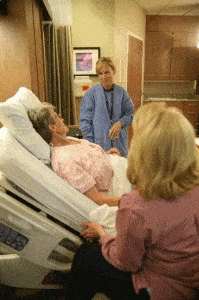 A recent study has identified an unusual phenomenon. For senior citizens, hospitalizations actually may cause temporary memory loss and difficulty in understanding discharge instructions, according to a Northwestern Medicine study.
A recent study has identified an unusual phenomenon. For senior citizens, hospitalizations actually may cause temporary memory loss and difficulty in understanding discharge instructions, according to a Northwestern Medicine study.
The seniors go back to normal one month after the hospital stay, the study found. But immediately following a hospitalization is a critical time in which seniors may need extra support from healthcare professionals and family, according to Lee Lindquist, M.D., the lead author of the study, published online in the Journal of General Internal Medicine.
“A helper on the day of discharge could make sure a senior understands discharge instructions and help her get home and follow instructions safely,” Lindquist said. “If a patient is by herself the day of a hospital discharge, it’s possible that she won’t comprehend complicated medical instructions, increasing medication errors and chances of re-hospitalization.”
More than 200 seniors, age 70 and older, who lived on their own in the Chicago area and were not diagnosed with dementia or other cognitive problems, took part in the study. At the time of discharge, cognition tests were administered to examine mental status. Almost one-third had low cognition that was previously unrecognized. One month later, 58 percent of those patients no longer had low cognition. They had significant improvement in areas of orientation, registration, repetition, comprehension, naming, reading, writing and calculation.
“When the senior is no longer sick enough to be in the hospital, it doesn’t mean they’re 100 percent ready to be on their own,” Lindquist said. “It’s a critical time and they need extra support and understanding from healthcare professionals and family.”
Help ensure that your mother is safe by providing extra assistance for the days and weeks after she returns home from the hospital. If you or another family member can’t be with her the entire time she’s recuperating, contact your local Home Instead Senior Care® office.
A Home Instead CAREGiver SM can assist an older adult from the transition from hospital to home with such services as personal care, meal preparation, medication assistance and transportation to doctor’s appointments. CAREGivers are screened, trained, bonded and insured.
For more about the study, go to http://www.northwestern.edu/newscenter/stories/2011/04/memory-loss-seniors.html.
CAREGivers from Home Instead Senior Care can make a difference in your life by providing companionship and support.
Throughout the year, our writers feature fresh, in-depth, and relevant information for our audience of 40,000+ healthcare leaders and professionals. As a healthcare business publication, we cover and cherish our relationship with the entire health care industry including administrators, nurses, physicians, physical therapists, pharmacists, and more. We cover a broad spectrum from hospitals to medical offices to outpatient services to eye surgery centers to university settings. We focus on rehabilitation, nursing homes, home care, hospice as well as men’s health, women’s heath, and pediatrics.








1 thought on “Home Helper Could Assist Patients Discharged from Hospital”
Comments are closed.